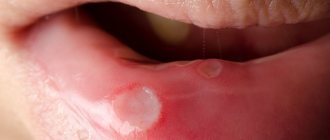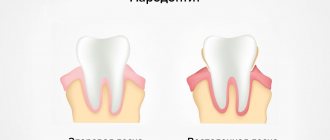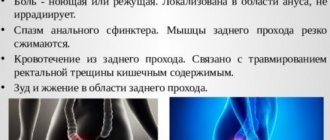A metallic taste may appear due to the consumption of specific foods or simple bleeding gums. Usually it does not linger for long and disappears without any outside intervention.
If a metallic taste in the mouth occurs repeatedly and for no apparent reason, then it is better to talk about the problem with a doctor.
. It is necessary to identify and eliminate the factor that led to the change in taste perception. But doing this on your own can be difficult, since many pathologies are asymptomatic and are detected only through laboratory tests.
Why does a metallic taste appear in the mouth?
A specific taste is felt due to an increase in the concentration of metal ions in the human body. It is extremely rare that this occurs as a result of chemical poisoning. For example, arsenic, zinc or cadmium.
Most poisonings occur at production facilities and laboratories where toxic compounds are used. Persons working with hazardous substances should not ignore even the slightest change in perception. Carelessness can cost them their lives.
More common causes of a metallic taste in the mouth are associated with exposure to external circumstances, the development of common diseases, hormonal imbalances or side effects from medications.
Influence of household factors
An iron taste may appear after drinking tap water. Huge amounts of iron-containing sediment accumulate in old pipes
, which dissolve in water and, entering the oral cavity with it, settle on the mucous membrane and oxidize. And the person begins to feel a sour smell and a metallic taste.
Mineral water can cause the same reaction. Many people drink it uncontrollably to enrich the body with microelements. However, their excess is no less harmful to health than their deficiency. Therefore, doctors do not recommend drinking more than 2 glasses of ordinary medicinal table mineral water per day.
Another common household factor is the use of stainless steel, aluminum or cast iron cookware
. If you cook a dish with foods high in acids in it, the latter will react with the material, which will lead to the appearance of a metallic taste.
GERD Treatment Methods
Treatment of GERD is carried out by a gastroenterologist. Treatment is aimed at relieving inflammation of the esophageal mucosa, reducing the frequency of reflux of stomach contents into the esophagus, reducing the damaging properties of refluxate (the substance that enters the esophagus from the stomach), and increasing the protective properties of the esophageal mucosa.
Of great importance is:
Drug treatment
Treatment with medications is prescribed by a doctor and must take into account the individual characteristics of the patient.
Lifestyle change
Normalization of lifestyle is of great importance. It is necessary to quit smoking, limit, or better yet eliminate, alcohol consumption. You should not eat fatty, spicy, sour foods, as well as coffee, tea, chocolate, legumes, cabbage, peas, and brown bread. It is better to take food more often (4-6 times a day), but in small portions. You should not eat before bed (the last meal should be 2-2.5 hours before bedtime). You should sleep with your upper body elevated to reduce the likelihood of reflux during sleep.
Make an appointment Do not self-medicate. Contact our specialists who will correctly diagnose and prescribe treatment.
Impact of common diseases
In addition to everyday factors, changes in taste perception are affected by internal pathologies. An unpleasant symptom in this case is observed over a long period of time.
Oral diseases
Quite often, the taste of metal indicates the development of the following dental diseases:
- Glossitis
is an infectious inflammation of the mucous membrane of the tongue, provoked by thermal, chemical burns or injuries. The main symptoms are swelling of the muscle organ, redness of its surface, a feeling of bitterness and an iron smell from the mouth. - Periodontal disease and periodontitis
are diseases that affect the gums. The inflammatory process provokes deformation of the periodontium - the tissues that surround the tooth. As a result, capillaries are damaged and bleeding develops. Blood, which contains large amounts of iron, gives saliva a metallic taste. - Gingivitis
is an inflammation of the gums, which is accompanied by redness, swelling and bleeding. Additional signs include pain, heavy plaque and acidic breath.
Pathologies of ENT organs
Sometimes a metallic taste on the tongue indicates a fungal infection of the mucous membranes of the pharynx, larynx, nose and paranasal sinuses. The following signs may indicate the development of an infectious process:
- sore throat;
- hearing loss;
- bleeding from the nose;
- feeling of dryness in the mouth;
- pain in the auricle or in the paranasal sinuses;
- increased sensitivity of mucous membranes to foods at borderline temperatures and spicy foods;
- a cheesy white coating covering the affected area and thickening abundantly in the morning.
Anemia
Another common cause of a metallic taste in the mouth is an imbalance of minerals. This phenomenon is observed in anemia, a pathological condition characterized by a decrease in the concentration of hemoglobin and, sometimes, red blood cells per unit volume of blood.
Despite the paradox, one of the main symptoms of an illness closely associated with iron deficiency is an iron taste in the mouth. In addition, for anemia:
- drowsiness and weakness appear;
- migraine attacks occur;
- often feel dizzy;
- heart rhythm is disturbed;
- mucous membranes are dehydrated;
- nails become brittle;
- tongue goes numb.
To confirm anemia, a routine blood test is performed. After treatment, which includes taking iron-containing drugs, the hemoglobin concentration normalizes - the metallic taste disappears.
Hypovitaminosis
A lack of vitamins can also lead to an iron taste in the mouth. This condition of the body is called hypovitaminosis and is characterized by symptoms such as sleep disturbances, low physical and intellectual activity, and groundless irritability.
A certain disease develops against the background of vitamin deficiency. For example, a lack of vitamin B1 can lead to pathologies such as beriberi, polyneuritis, paralysis, and central nervous system damage. Each disease has more specific symptoms.
A general list of possible signs:
- blurred vision;
- frequent conjunctivitis;
- constipation;
- nausea;
- decreased appetite;
- headache;
- paralysis;
- tachycardia;
- dyspnea;
- amyotrophy;
- nosebleeds;
- allergic manifestations.
Gastrointestinal diseases
The most common prerequisite for the occurrence of a metallic taste in the mouth in both men and women is pathology of the gastrointestinal tract. Moreover, by the severity of the sensation one can judge the stage of development of the disease.
| Affected organ | Probable diseases | General symptoms |
| Gallbladder |
|
|
| Stomach |
|
|
| Intestines | Any pathology that leads to disruption of the organ. |
|
| Liver | Any disease characterized by impaired liver function. |
|
Central nervous system diseases
The nervous system is responsible for processing impulses that come from taste buds. Therefore, the perception of taste may be distorted in pathologies of the central nervous system. For example, against the background of a stroke, neuritis of the facial nerve, Alzheimer's or Parkinson's disease.
The main signs of central nervous system damage:
- complete loss or partial decrease in muscle strength;
- tremor - trembling in the fingers, chin, upper limbs;
- speech and coordination disorders;
- involuntary muscle contractions;
- pain in the back, legs, arms, neck;
- insomnia or excessive sleepiness;
- constant migraine;
- smell and taste of copper in the mouth;
- Sometimes various parts of the body go numb.
Diabetes
A metallic taste on the tongue may mean the development of diabetes mellitus, a disease of the endocrine system that occurs when there is insufficient insulin production. The sensation occurs during a period of critical decrease in hormone production and provokes an increase in the concentration of acetone in the urine. If you inject insulin into a patient, the taste will disappear or become barely noticeable.
In diabetes mellitus, dry mucous membranes, constant thirst, and increased appetite are observed. Along with taste changes, visual impairment develops.
Help before diagnosis
In most cases, the following help to get rid of the symptom:
- keeping the oral cavity clean;
- regular and balanced nutrition;
- cessation of smoking, alcohol abuse;
- drink enough fluid during the day;
- moderate activity after meals.
You can temporarily remove the taste by thoroughly brushing your teeth, rinsing your mouth with water and lemon juice or baking soda, chewing gum, or special mouth fresheners.
Causes of metallic taste in the mouth in women
In women, the cause of iron taste in the mouth can be not only a lack of insulin, but also an imbalance of sex hormones: estrogen and progesterone. Hormonal changes are often observed during adolescence and before menopause. During these periods, unpleasant symptoms are suppressed by corrective therapy and quickly disappear.
Imbalance can also arise due to other reasons:
- pathologies of the thyroid gland;
- consequences of abortion and some surgical interventions;
- use of incorrectly selected contraceptive drugs;
- too strict diets;
- heredity;
- sexually transmitted infections;
- excessively late or early onset of sexual activity;
- weakened immunity and some common diseases;
- pregnancy.
Specific Prerequisites
A metallic taste in the mouth does not always indicate some kind of internal pathology or the presence of a household provocateur. Specific factors can influence the perceptions of both women and men. Among them:
- Taking medications
. The iron taste appears due to medications with toxic effects that inhibit liver function. These include Tetracycline, Metronidazole, Lansporazole and some types of dietary supplements. - Professional activity
. Harmful substances that a person works with constantly accumulate in his body and provoke various side effects, including coughing and a sour, bitter or aluminum taste. Particularly dangerous chemical elements include zinc, arsenic, cadmium, pigs, mercury, and copper. Some of the listed substances are often used in the manufacture of paints. - Diets
. Prolonged fasts combined with insufficient fluid intake lead to dehydration, which disrupts metabolic processes. As a result, a person feels constant weakness, dizziness and a taste of aluminum.
How to determine the cause
To find out what a metallic taste in the mouth means, you need to pay attention to the conditions under which it arose. For example, if the sensation appears after drinking water, you need to check the condition of the pipes. A sharp change in the composition of the diet or taking medications can also affect the perception of receptors.
If the cause lies in the development of any disease, this will be indicated by a number of accompanying symptoms:
- skin itching, thirst in the morning, blurred vision accompany diabetes mellitus;
- dry throat, cough, white plaque on the tonsils – pharyngitis and tonsillitis;
- abdominal cramps, heartburn, belching – stomach ulcers;
- nausea, weight loss, lack of appetite - liver disease;
- pain in the right side, bitterness, alternating diarrhea and constipation - gallbladder pathologies;
- drowsiness, weakness, pallor, dizziness and arrhythmia - anemia.
Making a diagnosis on your own is quite difficult. Even if you understand the nature of this manifestation, you cannot do without consulting a doctor and laboratory tests. Therefore, if the taste of iron in the mouth is observed for a long time, it is worth contacting a therapist who will prescribe the necessary tests. Treatment will be carried out by a more specialized specialist: a gastroenterologist, ENT, pulmonologist, endocrinologist or even an oncologist.
Diagnostics
In order to determine the cause of sour taste in men , it is necessary to undergo a comprehensive examination, which will exclude or confirm certain diseases. Comprehensive diagnostics includes the following activities:
- esophagogastroduodenoscopy (most informative for diagnosing gastric ulcers ;
- gastric pH-metry;
- ultrasound examination of the abdominal organs, including the liver and gallbladder;
- ultrasound examination of the pancreas;
- biochemical blood test, including liver tests and assessment of pancreatic enzyme levels;
- general clinical blood test;
- assessing blood glucose levels;
- consultation with a neurologist, endocrinologist, gastroenterologist, hepatologist;
- analysis for glycosylated hemoglobin.










